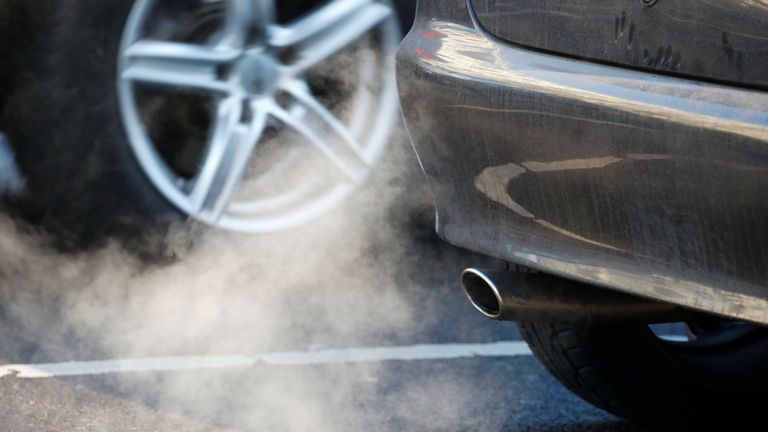[ad_1]
A doctor has warned that air pollution can make severe COVID-19 worse, following a small study from one of America’s most polluted cities.
Researchers who studied 2,038 adults hospitalised with coronavirus in Detroit found those who required ventilators and intensive care were more likely to live in neighbourhoods with higher levels of air pollution and lead paint.
Live COVID updates from the UK and around the world
The study found that the worse the local air contamination, the higher the odds of needing intensive care and mechanical ventilation.
Dr Anita Shallal of Detroit’s Henry Ford Hospital warned that long-term exposure to air pollution can impair the immune system and make it more susceptible to viral infections.
She said that fine particles in air pollution may also act as a carrier for the virus and help it spread.
Dr Shallal added that the study “calls attention to the systemic inequalities that may have led to the stark differences in COVID-19 outcomes along racial and ethnic lines”.
“Communities of colour are more likely to be located in areas closer to industrial pollution, and to work in businesses that expose them to air pollution.”
In a separate study from October 2020, long-term exposure to air pollution was linked to an increased risk of dying from COVID-19.
The study, published in Cardiovascular Research, also estimated the proportion of deaths from coronavirus that could be attributed to the exacerbating effects of air pollution for every country in the world.
Researchers estimated that about 15% of deaths worldwide from COVID could be attributed to long-term exposure to air pollution.
The proportion was around 19% in Europe, 17% in North America and 27% in East Asia.
Researchers wrote that these proportions are an estimate of “the fraction of COVID-19 deaths that could be avoided if the population were exposed to lower counterfactual air pollution levels without fossil fuel-related and other anthropogenic [caused by humans] emissions”.
Another study published in the journal Science Advances last year suggested that a small rise in people’s long-term exposure to air pollution was associated with an 11% increase in deaths from COVID-19.
Researchers considered the impact of a single-unit rise in average particle pollution over 16 years before the pandemic on COVID deaths in 3,089 US counties, covering 98% of the population.
It included 116,747 deaths that occurred up to 18 June 2020 and took into account more than 20 other factors such as population densities, hospital bed provision, and social and economic status.
While studies have pointed out that air pollution may be a contributing factor to COVID-19 severity, the specific links between pollution and severe symptoms remain unclear.
[ad_2]
Source link












